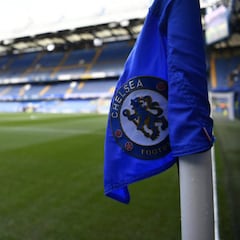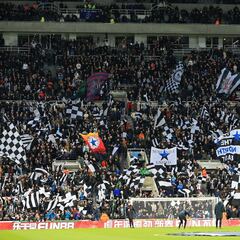How many foreign players can play in a Premier League team?
There are now 371 non-English players in the Premier League - more than twice as many as there were in the competition’s inaugural season.


Teams are allowed to field as many non-English players as they like in a Premier League match; indeed, England’s top flight has now witnessed hundreds of all-foreign starting line-ups.
Chelsea the first all-foreign team; Villa the last all-English
Chelsea were the first side to name a Premier League XI without a single Englishman in it, in a 2-1 win at Southampton on Boxing Day 1999. Striker Tore Andre Flo scored both goals for a Blues team which, in addition to the Norwegian, featured a Dutchman, a Spaniard, a Romanian, a Brazilian, a Uruguayan, a Nigerian, two Frenchmen and two Italians.
Since then, Arsenal have become the side most associated with the all-foreign Premier League line-up: as of February 2019, the Gunners had named 173 of them.
And it’s over 20 years since Aston Villa manager John Gregory put out what remains the last all-English team in the Premier League, in February 1999. The three substitutes Villa introduced that day were also non-foreign, but the result certainly wasn’t an endorsement of the merits of going English: the Birmingham side were hammered 4-1 by Coventry City.
Two-thirds of Premier League players now foreign
When you look at the figures, the rise of Premier League teams exclusively featuring overseas players is little surprise.
In the first ever season of the Premier League, 1992/93, there were 176 non-English players in the league. By 1999/2000, the season of Chelsea’s historic team selection at the Dell, that figure had risen to 306. Today, there are 371, more than double the original number, with foreign players accounting for just under 66% of all Premier League footballers.

Limit on ‘non-homegrown’ players in Premier League squads
However, while there are no restrictions on the number of foreigners a team can field in a Premier League game, there is a cap on how many ‘non-homegrown’ players that clubs can include in their first-team squad.
According to Premier League rules, clubs can have a maximum of 25 players in their senior squad, of which no more than 17 are allowed to come under the ‘non-homegrown’ category. A non-English player isn’t necessarily given such a status, though.
Footballers are considered ‘homegrown’ if they have played for an FA-affiliated club for three years by the age of 21, so Frenchman Paul Pogba and Spaniards Cesc Fàbregas and Héctor Bellerín are examples of foreigners who have not counted towards the Premier League’s ‘non-homegrown’ limit.
That said, such cases will now be rarer and rarer because of Brexit: the UK’s departure from the EU means English clubs can no longer sign any international players under 18.
When Premier League teams did have to choose between foreigners
Though Premier League clubs have never had to worry about how many non-English players they can field in domestic fixtures, this hasn’t always been the case in Europe. Until the mid-1990s, UEFA allowed sides to field only three foreign players in its club competitions, in addition to two foreigners who had been long-term residents of their team’s country.
Against the backdrop of a growing influx of overseas stars in the Premier League of the 90s, the regulation proved a major hindrance to England’s representatives in the European Cup/Champions League, the UEFA Cup (since rebranded as the Europa League) and the now-defunct Cup Winners’ Cup.
So much so that between 1990, when English clubs returned to European competitions after a five-year ban, and 1996, when the European Court of Justice scrapped UEFA’s limit on foreigners, no team from the country reached the latter stages of the European Cup, the continent’s top-tier competition. Manchester United and Arsenal’s Cup Winners’ Cup wins in 1991 and 1994, respectively, were the only times an English side lifted a continental trophy.
A European night that became emblematic of English clubs’ struggles to cope with the ‘three-foreigners’ rule is a particularly chastening defeat suffered by United in November 1994.
Related stories
Forced to choose between his non-English stars for a Champions League group-stage match away to Barcelona, United manager Alex Ferguson opted to bench Danish goalkeeper Peter Schmeichel and field his understudy, the far inferior Gary Walsh. The result at the Camp Nou? United were walloped 4-0.
“It’s come two years late for us,” Ferguson complained after the ‘three-foreigners’ rule was abolished. “We’d have had a chance of winning the European Cup in 1994 otherwise.”
See also: Football vs soccer - what’s with the different names?


